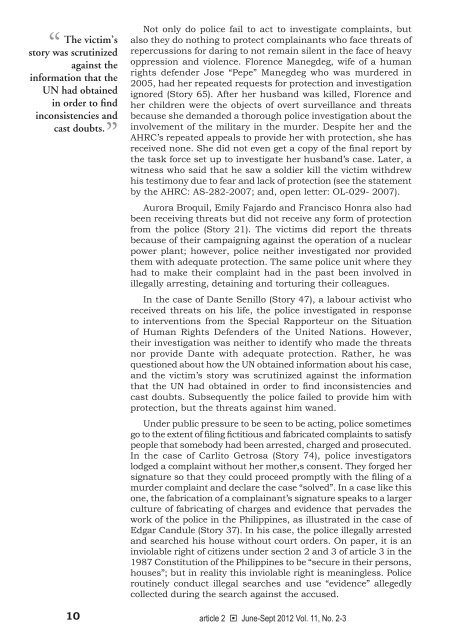Create successful ePaper yourself
Turn your PDF publications into a flip-book with our unique Google optimized e-Paper software.
“<br />
The victim’s<br />
story was scrutinized<br />
against the<br />
information that the<br />
UN had obtained<br />
in order to find<br />
inconsistencies and<br />
cast doubts.<br />
10<br />
”<br />
not only do police fail to act to investigate complaints, but<br />
also they do nothing to protect complainants who face threats of<br />
repercussions for daring to not remain silent in the face of heavy<br />
oppression and violence. Florence manegdeg, wife of a human<br />
rights defender Jose “Pepe” manegdeg who was murdered in<br />
2005, had her repeated requests for protection and investigation<br />
ignored (Story 65). After her husband was killed, Florence and<br />
her children were the objects of overt surveillance and threats<br />
because she demanded a thorough police investigation about the<br />
involvement of the military in the murder. Despite her and the<br />
AhRC’s repeated appeals to provide her with protection, she has<br />
received none. She did not even get a copy of the final report by<br />
the task force set up to investigate her husband’s case. Later, a<br />
witness who said that he saw a soldier kill the victim withdrew<br />
his testimony due to fear and lack of protection (see the statement<br />
by the AhRC: AS-282-2007; and, open letter: OL-029- 2007).<br />
Aurora Broquil, Emily Fajardo and Francisco honra also had<br />
been receiving threats but did not receive any form of protection<br />
from the police (Story 21). The victims did report the threats<br />
because of their campaigning against the operation of a nuclear<br />
power plant; however, police neither investigated nor provided<br />
them with adequate protection. The same police unit where they<br />
had to make their complaint had in the past been involved in<br />
illegally arresting, detaining and torturing their colleagues.<br />
In the case of Dante Senillo (Story 47), a labour activist who<br />
received threats on his life, the police investigated in response<br />
to interventions from the Special Rapporteur on the Situation<br />
of human Rights Defenders of the united nations. however,<br />
their investigation was neither to identify who made the threats<br />
nor provide Dante with adequate protection. Rather, he was<br />
questioned about how the un obtained information about his case,<br />
and the victim’s story was scrutinized against the information<br />
that the UN had obtained in order to find inconsistencies and<br />
cast doubts. Subsequently the police failed to provide him with<br />
protection, but the threats against him waned.<br />
under public pressure to be seen to be acting, police sometimes<br />
go to the extent of filing fictitious and fabricated complaints to satisfy<br />
people that somebody had been arrested, charged and prosecuted.<br />
In the case of Carlito getrosa (Story 74), police investigators<br />
lodged a complaint without her mother,s consent. They forged her<br />
signature so that they could proceed promptly with the filing of a<br />
murder complaint and declare the case “solved”. In a case like this<br />
one, the fabrication of a complainant’s signature speaks to a larger<br />
culture of fabricating of charges and evidence that pervades the<br />
work of the police in the Philippines, as illustrated in the case of<br />
Edgar Candule (Story 37). In his case, the police illegally arrested<br />
and searched his house without court orders. On paper, it is an<br />
inviolable right of citizens under section 2 and 3 of article 3 in the<br />
1987 Constitution of the Philippines to be “secure in their persons,<br />
houses”; but in reality this inviolable right is meaningless. Police<br />
routinely conduct illegal searches and use “evidence” allegedly<br />
collected during the search against the accused.<br />
article 2 � June-Sept 2012 Vol. 11, No. 2-3


